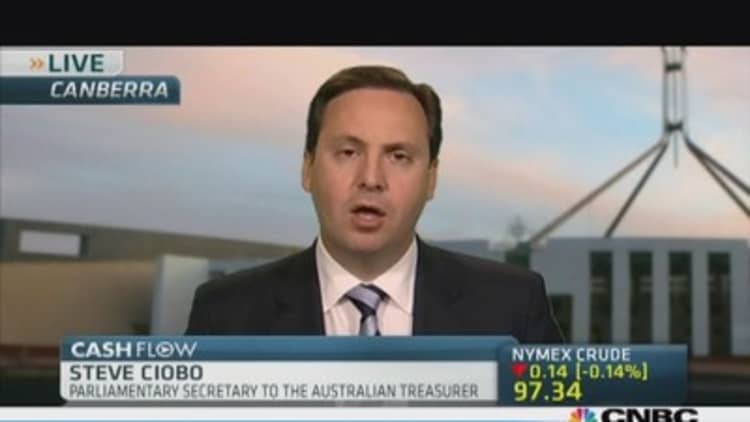Asian stocks joined the global rally on Tuesday after strong data from the euro zone and the U.S. outweighed caution over the possibility of a reduction in Federal Reserve stimulus.
Markit's flash composite purchasing manager's index (PMI) for the euro zone beat expectations to hit 52.1 in November, while U.S. industrial production rose 1.1 percent in November, its biggest surge in a year.
"Global growth projections by many researchers, including the IMF, predict that the US will be the key driver and Europe will come out of recession. The projections put global growth to average between 3.4-3.6 percent next year, from this year's 2.9 percent," said Kelly Teoh, market strategist at IG.
(Read more: Is a 'panic taper' the real risk to markets?)
Nikkei rallies 0.8%

Japanese stocks rebounded after closing near a one-month low in the previous session as dollar-yen climbed back above the 103 handle.
Among the most actively traded stocks, index heavyweights Fast Retailing, Fanuc and SoftBank jumped over 1 percent each.
Defense stocks rose after Japan said it will boost military spending to counter against a more assertive China. The new agenda comes amid heightened tension over Beijing's new air-defense zone in the East China Sea. Kawasaki Heavy led gains by 2 percent.
Shanghai dips 0.4%
China's benchmark Shanghai Composite index closed at a new one-month low for a second consecutive session, underperforming the rest of its Asian peers.
(Watch now: )
Steel producers declined on fears of more shutdowns next year as Beijing tries to tackle overcapacity. Baoshan Steel fell 1 percent while Maanshan Iron inched down 0.6 percent.
Fears of tight liquidity weighed on sentiment after the China Banking Regulatory Commission called on lenders to manage their liquidity conditions for the year ahead.
Sydney rises 0.3%
Australia's S&P ASX 200 pared gains after the nation's Treasurer said the budget deficit could swell to A$47 billion in the year ending June 2014, well above August's A$30.1 billion forecast.
(Read more: Australia sees budget deficit blowout of $42 billion)

Still, the index snapped eight straight sessions of losses and closed above it's 200-day simple moving average of 5,104 points for the first time in four sessions.
Banks lent support with Australia New Zealand Banking and National Australia Bank both 0.6 higher while miners gained on higher copper prices. rallied 3 percent and added 1 percent.
Meanwhile, minutes from the Reserve Bank of Australia's December policy meeting showed the central bank maintained its easing bias and reiterated that the remains uncomfortably high, even as it trades near three-and-a-half month lows around $0.89 U.S. cents.
(Read more: )
Kospi up 0.2%
South Korean shares recovered after closing at their lowest level in over three months on Monday despite data showing that producer prices fell at their slowest annual rate in a year in November.
Telecom stocks led the gains. KT jumped 1.5 percent after nominating former Samsung president Hwang Chang-Gyu as chairman while SK Telecom rallied 3 percent.
(Watch: )
Steel maker POSCO closed down 0.3 percent after appealing to a panel headed by Indian prime minister Manmohan Singh to speed up clearance for its long-delayed India steel project.
Emerging markets higher
Southeast Asian markets tracked Asia-wide gains. closed 2 percent higher and Indonesia's jumped 1.37 percent. Indian stocks closed the session lower by 0.2 percent after initially trading higher.
— By CNBC.com's Nyshka Chandran. Follow her on Twitter @NyshkaCNBC

